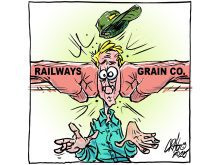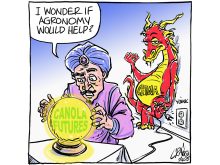Farmers may feel they are caught in the middle of a debate that pits their crops against their crops.
Are canola, soybeans, wheat and corn food? Or are they fuel? Does it matter, so long as there are price incentives to grow the crops?
The Russian invasion of Ukraine has left the world short of both food and fuel. Before that, food and fuel were in a declining supply-to-demand ratio. The pandemic created supply chain issues but the underlying causes for shortages of energy and food were made more apparent by disrupted trade and human behaviour related to the pandemic.
Read Also

Kochia has become a significant problem for Prairie farmers
As you travel through southern Saskatchewan and Alberta, particularly in areas challenged by dry growing conditions, the magnitude of the kochia problem is easy to see.
On the fuel side, many people drastically cut their commuting and other travel during the first 18 months of the COVID-19 infection. That spawned some of the lowest fuel prices in decades as refining capacity heavily outstripped demand. Refiners then shuttered older facilities, many of them large. Overcapacity was already on refiners’ agendas as the world began a shift to less carbon-intensive energy sources. But as the world began moving around again, the shortage of refined fuels became apparent and prices quickly rose.
At the same time, biofuel production was being encouraged by many governments, spurring additional crushing and distilling capacity.
Food stocks have been sliding for years. Corn and wheat inventories have fallen steadily. The pandemic disrupted just-in-time delivery of grains and oilseeds for processing on the food side of the equation, creating scarcity ahead of actual shortages.
Shortage of fuel or food isn’t an issue for most of the developed world. Here, people will divert money from other expenses to cover basic needs. But for developing countries, supply shortages turn into bidding wars for the basics.
At last weekends’ G7 Summit in Germany, representatives of some of the largest global economies discussed Russia’s war against the Ukraine and its fallout on food supplies in the developing world.
Like Canada, Ukraine is a small crop producer but an international powerhouse in terms of exports. Its proximity to Africa has made it an efficient provider of commodities for that region. Russia’s restrictions on Ukrainian exports and the overall impairment of food crop sales have undermined the stocks-to-use ratio and boosted prices from already elevated levels. Now food is too expensive for the already hungry parts of the planet.
Last week the G7 nations, led by Britain and Germany, considered temporarily dropping biofuel mandates to reduce grain and oilseed demand, which would lower food prices worldwide. That would also increase energy costs because nothing is free in a free market.
However, it appears Canada and the United States are scuttling those plans.
An acre of land can only be cropped once in a growing season. What it produces can be used for many things.
Many farmers’ personal identities are tied to feeding humanity. Others are more circumspect, seeing their role as powering the planet in one form or another. Still others look at their crops as a business piece of the giant economic puzzle.
Should the G7 decide to shelve biofuel mandates, it would lower prices for crops, placing less demand on each acre for fuel. Farmers would pay for that from their own pockets.
But farmers are used to being price takers in the global economy.
Karen Briere, Bruce Dyck, Barb Glen and Mike Raine collaborate in the writing of Western Producer editorials.

















